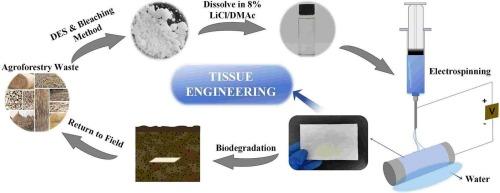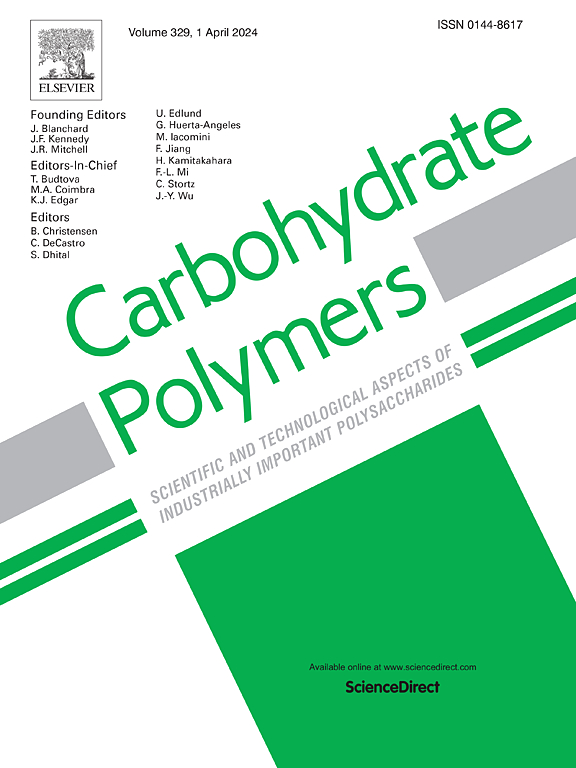How to select agroforestry waste biomass for electrospinning and its potential application in bone tissue engineering
IF 10.7
1区 化学
Q1 CHEMISTRY, APPLIED
引用次数: 0
Abstract
The high value-added utilization of agroforestry waste biomass is an urgent requirment. Herein, a feasible approach was provided to obtain biodegradable cellulose fibrous films from agroforestry waste biomass. The cellulose used was extracted from agroforestry waste biomass and then the cellulose fibrous film was obtained by direct electrospinning. Lignin-carbohydrate complex (LCC) structure was considered as the key factor for the dissolution of lignocellulose, while cellulose molecular weight > 335,664 was suitable for electrospinning. Bamboo cellulose was chosen as an example to verify the potential application of the electrospun cellulose films from agroforestry waste biomass. The as-prepared electrospun bamboo cellulose fibrous film exhibited a tensile strength of 24.12 MPa, which outperformed most of the reported electrospun nanofibrous films. Moreover, the film possessed a super-wetting surface and outstanding cytocompatibility. These excellent properties offer the film with immense potential for application in bone tissue engineering. In addition, this work provides a new route for transforming agroforestry waste into high value-added products.

如何选择用于电纺丝的农林废弃生物质及其在骨组织工程中的潜在应用
农林废弃生物质的高附加值利用是一个迫切的需求。本文提供了一种从农林废弃生物质中获得可生物降解纤维素纤维膜的可行方法。所使用的纤维素是从农林废弃生物质中提取的,然后通过直接电纺获得纤维素纤维膜。木质素-碳水化合物复合物(LCC)结构被认为是木质纤维素溶解的关键因素,而纤维素分子量> 335,664适合电纺丝。为了验证从农林废弃生物质电纺纤维素薄膜的潜在应用,我们选择了竹纤维素作为例子。所制备的电纺竹纤维素纤维膜的拉伸强度为 24.12 兆帕,优于大多数已报道的电纺纳米纤维膜。此外,该薄膜还具有超强的表面润湿性和出色的细胞相容性。这些优异的性能为薄膜在骨组织工程中的应用提供了巨大的潜力。此外,这项研究还为将农林废弃物转化为高附加值产品提供了一条新途径。
本文章由计算机程序翻译,如有差异,请以英文原文为准。
求助全文
约1分钟内获得全文
求助全文
来源期刊

Carbohydrate Polymers
化学-高分子科学
CiteScore
22.40
自引率
8.00%
发文量
1286
审稿时长
47 days
期刊介绍:
Carbohydrate Polymers stands as a prominent journal in the glycoscience field, dedicated to exploring and harnessing the potential of polysaccharides with applications spanning bioenergy, bioplastics, biomaterials, biorefining, chemistry, drug delivery, food, health, nanotechnology, packaging, paper, pharmaceuticals, medicine, oil recovery, textiles, tissue engineering, wood, and various aspects of glycoscience.
The journal emphasizes the central role of well-characterized carbohydrate polymers, highlighting their significance as the primary focus rather than a peripheral topic. Each paper must prominently feature at least one named carbohydrate polymer, evident in both citation and title, with a commitment to innovative research that advances scientific knowledge.
 求助内容:
求助内容: 应助结果提醒方式:
应助结果提醒方式:


